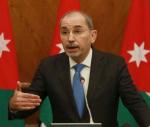You are here
Egypt accuses Muslim Brotherhood, Hamas of assassinating prosecutor
By Reuters - Mar 06,2016 - Last updated at Mar 06,2016

In this June 29, 2015 file photo, Egyptian policemen stand guard at the site of a bombing that killed Egypt’s top prosecutor Hisham Barakat, who oversaw cases against thousands of Islamists, in Cairo, Egypt (AP photo)
CAIRO — Egypt has accused exiled Muslim Brotherhood officials of conspiring with Gaza-based Hamas fighters to assassinate Public Prosecutor Hisham Barakat last year and arrested 14 people in connection with the attack.
Barakat, 64, was killed by a car bomb in Cairo in June 2015. He was the most senior state official assassinated since the toppling in mid-2013 of elected president Mohamed Morsi of the Muslim Brotherhood. There was no claim of responsibility for the attack at the time.
Interior Ministry Magdi Abdel Ghaffar told a news conference that the attack was ordered by Turkey-based leaders of Egypt's oldest Islamist movement and coordinated with fellow Islamist group Hamas, which he said provided training and explosives.
"This is a very big conspiracy that started a long time ago and continued," he said.
The Muslim Brotherhood denied the accusations.
"You are the real conspiracy against Egypt. You are the murderers. Look amongst you for the killers of your public prosecutor you infidels and murderers," the group's spokesman Mohamed Montaser said in a statement.
Hamas spokesman Sami Abu Zuhri denied the accusations, calling them groundless and incorrect.
Abdel Ghaffar said Egypt had arrested 48 members of a Brotherhood cell aimed at undermining security through a series of attacks. Fourteen of them had confessed to killing Barakat.
He said Yehia Moussa, health ministry spokesman during Morsi’s presidency, had planned the operation. Moussa is now living in Turkey.
Judges and other senior officials have been targeted by radical Islamists since then-military chief Abdel Fattah Al Sisi ousted Morsi following mass protests against his turbulent rule.
Sisi, who went on to win a presidential election in 2014, banned the Brotherhood and jailed thousands of its followers. Shortly after Sisi took power, security forces killed hundreds of Morsi supporters in a single day in the bloodiest episode in Egypt’s modern history.
The Egyptian judiciary says it is independent of the government and military, but some judges have been accused by human rights groups of bias after handing down lengthy jail terms and mass death sentences.
The crackdown, which has included restrictions on freedom of protest, has angered many opponents of Sisi who has struggled to suppress an insurgency that is raging in the eastern Sinai Peninsula, which borders Hamas-controlled Gaza and Israel.
Video confessions
Barakat’s assassination cast doubt on Egypt’s ability to contain the insurgency, which has seen hundreds of police and soldiers killed since Sisi took over. The Brotherhood has been designated terrorist. The group says it rejects violence.
The most active militant group is Sinai Province, which has pledged allegiance to the Daesh terror group. Egypt makes no distinction, describing such groups as an existential threat.
The interior ministry showed video clips of men, most in their early 20s, confessing to joining protests and later attacking police with fireworks, destroying electricity towers and going to Gaza for military training from Hamas.
“I received a firearms course, a car bomb course and a military tactics course. I returned to Egypt three months later and remained in contact with Hamas intelligence officers,” one young man told the camera.
“I was later told to prepare for an operation with others where we would assassinate the public prosecutor.”
The young men said they planted a car filled with explosives and detonated it remotely the following day as Barakat’s motorcade passed by.
“As soon as the motorcade moved [near the car bomb] I pressed the button and we took a photo then moved in a red hatchback car,” said another young man.
Authorities have repeatedly paraded on video what they say are militants confessing to violence. It was not immediately possible to verify the authenticity of the confessions.
Human rights groups have documented many cases of “enforced disappearances” since the end of 2013. Detainees are prevented from seeing lawyers or families for weeks or months and rights groups say they are sometimes tortured to extract confessions.
Egypt’s interior ministry denies accusations of systematic abuse.
Related Articles
CAIRO — Egypt's top public prosecutor died of wounds sustained in a car bomb attack on his convoy as it was leaving his home on Monday, the
CAIRO — A visibly angry Egyptian President Abdel Fattah Al Sisi pledged tougher laws against militants and suggested fast track executions a
GAZA CITY — Hamas called for Egypt to loosen restrictions on the Gaza Strip on Tuesday, a delegate said, after officials from the Islamist g

















